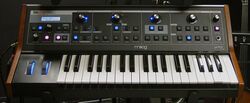Engineering:Moog Little Phatty
| Little Phatty | |
|---|---|
 Little Phatty Tribute Edition | |
| Manufacturer | Moog Music |
| Dates | 2006-2013 |
| Technical specifications | |
| Polyphony | monophonic[1] |
| Oscillator | 2 |
| LFO | 1 |
| Synthesis type | Analog subtractive |
| Filter | 1 selectable 6, 12, 18 or 24dB/octave low-pass |
| Attenuator | ADSR |
| Aftertouch expression | no |
| Velocity expression | yes |
| Storage memory | 100 patches |
| Effects | none |
| Input/output | |
| Keyboard | 37 keys[2] |
| External control | MIDI, CV/Gate |
The Little Phatty is a monophonic analog synthesizer manufactured by Moog Music from 2006 to 2013, preceded by the Voyager and succeeded by Voyager Old School. Its design was conceived, in part, by Robert Moog himself, and is the last instrument to have that distinction, although the primary engineer was Cyril Lance. It is also the first Moog product to be produced following his death. Jordan Rudess of the band Dream Theater also assisted with the design of the product.[3]
It is one of the few Moog synthesizers to utilize MIDI from the factory (the others being the Minimoog Voyager and the earlier Memorymoog+). This allows for better integration in the modern studio and for live performance.
On 9 September 2013, Moog Music announced the discontinuation of the Little Phatty analog synthesizer.
Versions
There are currently four versions of the Little Phatty. Aside from a few cosmetic differences (and price), all units have nearly identical sound generation circuitry.
Tribute Edition
The earlier 'Tribute Edition', a limited run of 1200 units, featured blue LED lighting, wooden side panels and Bob Moog's signature decaled onto the convex back panel.
Stage Edition
The later 'Stage Edition' featured orange and red lighting, grey rubberized panels and the classic Moog logo replacing the signature.
Stage II
The third version, called the Stage II, had some minor mechanical and electrical tweaks as well as adding a USB interface, a new arpeggiator and tap tempo.[4]
Limited Edition
There is also a rare limited edition with blue LED lighting that came in a purple aluminum case. This version also has the USB interface. It has the regular Moog logo on the back panel and shipped in a custom flight case with the Moog logo on the case. This was a limited run of 100 units.
References
- ↑ "Little Phatty by Bob Moog". Sound On Sound. November 2006. Archived from the original on 9 April 2015. https://web.archive.org/web/20150409141516/http://www.soundonsound.com/sos/nov06/articles/phatty.htm.
- ↑ "Little Phatty by Bob Moog |" (in en-gb). https://www.soundonsound.com/reviews/little-phatty-bob-moog.
- ↑ Adams, Mike. "Little Phatty Analog Synthesizer: Stage II Edition". https://api.moogmusic.com/sites/default/files/2018-09/Little_Phatty_Manual.pdf. Retrieved April 11, 2019.
- ↑ "Review: Moog Little Phatty Stage II" (in en-US). WIRED. https://www.wired.com/2011/10/moog-little-phatty/. Retrieved 2018-08-16.
External links
- Little Phatty from Moog Music site
- Moog Announces Discontinuation of Little Phatty Analog Synthesizer
 |



